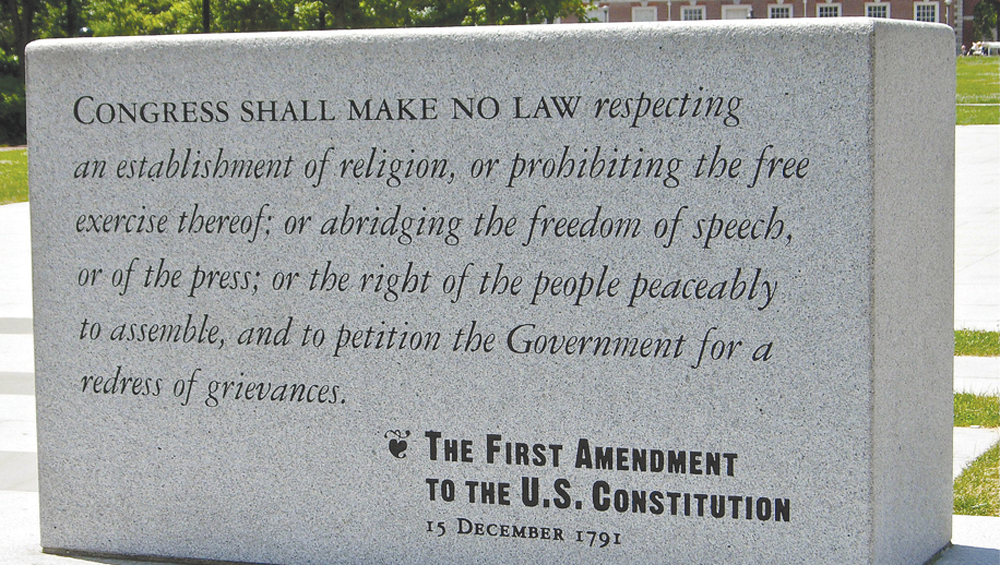
Kansas Newspaper Raid Outrage Offers Warning To TV News


Hank Price
The First Amendment to our Constitution is often misunderstood. It was not written because the founders liked newspapers. Many of them did not. The goal was to make sure there would always be free voices, unfettered by government interference, to hold those in power accountable.
Only by giving news media blanket protection could free voices be guaranteed. Over the years, courts have determined that the First Amendment also protects the process of news gathering, including such things as reporter notes and unfinished stories.
All of this is why last week’s shocking Gestapo-like raid on the Marion County Kansas Record by local police and sheriff’s deputies is such an outrage. It was a gross violation of the entire point of the First Amendment, clearly designed to intimidate and chill the newspaper’s voice.
The image of a police chief injuring a reporter as he wrestled her cell phone from her hand should send chills down every journalist’s spine. Adding tragedy to the terror, the paper’s 98-year-old publisher died of a heart attack the next day.
If it could happen there, it could happen anywhere.
How were such appalling actions justified? The First Amendment does not give news media the right to break laws, such as trespassing, illegal entry, stealing materials and other statutes. Thus, when a local judge issued a search warrant for the newspaper’s offices, employee’s homes, and even personal cell phones, it was on the pretext of other laws being broken.
The problem with the Kansas outrage is the genie cannot be put back in the bottle. No matter what sanctions may be later applied to the judge and police, government officials now know every story, the details of every investigation, the names and phone numbers of every source and every other piece of privileged material gathered by the newspaper. They even know the details of completely unrelated material such as advertiser contracts.
Think the same thing can’t happen to a television station? Think again. In fact, television news departments are at even greater risk of government overreach.
Though we assert the same First Amendment rights and privileges as newspapers, television stations face two stumbling blocks. The first is that only the “press” is specifically mentioned in the amendment. The second is that we operate as holders of government licenses.
Both of these issues are seen as technicalities by broadcasters. The press reference is clearly a generic for news media and should be extended to coverage by modern technology. The license issue is a red herring, especially since the Communications Act requires broadcasters to operate in the public “interest, convenience and necessity,” which obviously includes news.
On a practical basis, there is constant tension between law enforcement authorities and television news departments, not to mention private attorneys seeking redress over news stories unfavorable to their clients.
Most judges understand that violating the rights of a news organization is serious business and would find it very unusual to issue an actual search warrant. Instead, judges routinely issue subpoenas demanding stations disclose specific information. Standard practice at most stations is to immediately forward such subpoenas to council, who then assert the station’s First Amendment rights while seeking a compromise that serves the needs of all parties.
Even so, at every television station I have managed we prepared a game plan should an unannounced search warrant be presented. Rule No. 1 was to comply. To do otherwise risked an obstruction charge. Rule No. 2 was to turn out every available photographer to fully record the search. Rule No. 3 was to immediately get our attorneys involved.
At one station I ran we became so concerned about a possible FBI raid that the news director and I chose to store sensitive source material off site in private storage. Thankfully, we were not raided.
At another station I was personally threatened with arrest by a district attorney if I did not pull what he viewed as an illegal political commercial. We continued to run the spot, but I had a local attorney standing by with bail money if needed.
Every television station general manager with an aggressive news department has stories of First Amendment conflicts. The point is that if your station does not have a plan to deal with potential search warrants — a plan specifically approved by your attornies — you will be well advised to create one immediately. Not only that, but your staff needs to be aware of the plan because the last thing you want is an unnecessary employee arrest.
It is also critical that every news reporter and photographer be trained in basic laws, such as trespassing on private property and other violations that could end up hurting the integrity of a news story.
Though it is very rare, any rogue judge at almost any level can issue a search warrant for materials at your TV station. Neither the judge nor law enforcement has any obligation to give warning. You will discover the raid when they walk in your front door. That is why you must be prepared.
The First Amendment is unique to the American Constitution. In most countries, including Canada and Europe, judges have the ability to suppress specific stories from being reported by news media. Only in the United States is prior restraint of the press illegal. Only in the United States is freedom of speech fully guaranteed.
If you are in the news business, understand the First Amendment so that you can defend and protect it, because without the right to investigate, uncover and then speak freely without government interference, we risk the loss of liberty itself.
Hank Price spent 30 years leading television stations for Hearst, CBS and Gannett while concurrently building a career in executive education. He is the author of Leading Local Television and two other books.
































Comments (3)
BeyondTheBeltway says:
August 15, 2023 at 10:01 am
This story is a wake up call!
As horrible as it is, hopefully it will make reporters more aware that remaining silent when other’s rights are stepped on only encourages more of the same. Remaining silent while Trump and his allies have been railroaded has fueled this rogue behavior. If left unchecked, the tyrants eventually will come after all of us. God bless the bill of rights. Let’s defend it or we will lose it. It doesn’t matter if it is a local sheriff, the DOJ or Donald Trump or Sister Theresa, selective outrage is the same as doing nothing.
In part, a naive, political media has created this monster and the same media must reel it in before it is too late.
RustbeltAlumnus2 says:
August 15, 2023 at 10:51 am
All of these breathless news reports leave out a detail: DId the Sheriff’s Office have a court order signed by a judge? Nobody reports on this detail, why not? Looks like a circle-the-wagons style of reporting. No part of the Bill of Rights is absolute. Details matter. Report the entire story and leave in the details.
OldSchool says:
August 16, 2023 at 10:35 am
A political media has created their own monster. No matter what party you support what is going on currently with media and politics is not what should be happening. Refusing to report and investigate one person and then completely 24/7 coverage and investigation of another has shown what can and is happening. Our government will always control the narrative if at all possible it is and has been the job of the media to report and hold our government officials accountable. We need to wake up and do our job professionally without bias or pay the price.